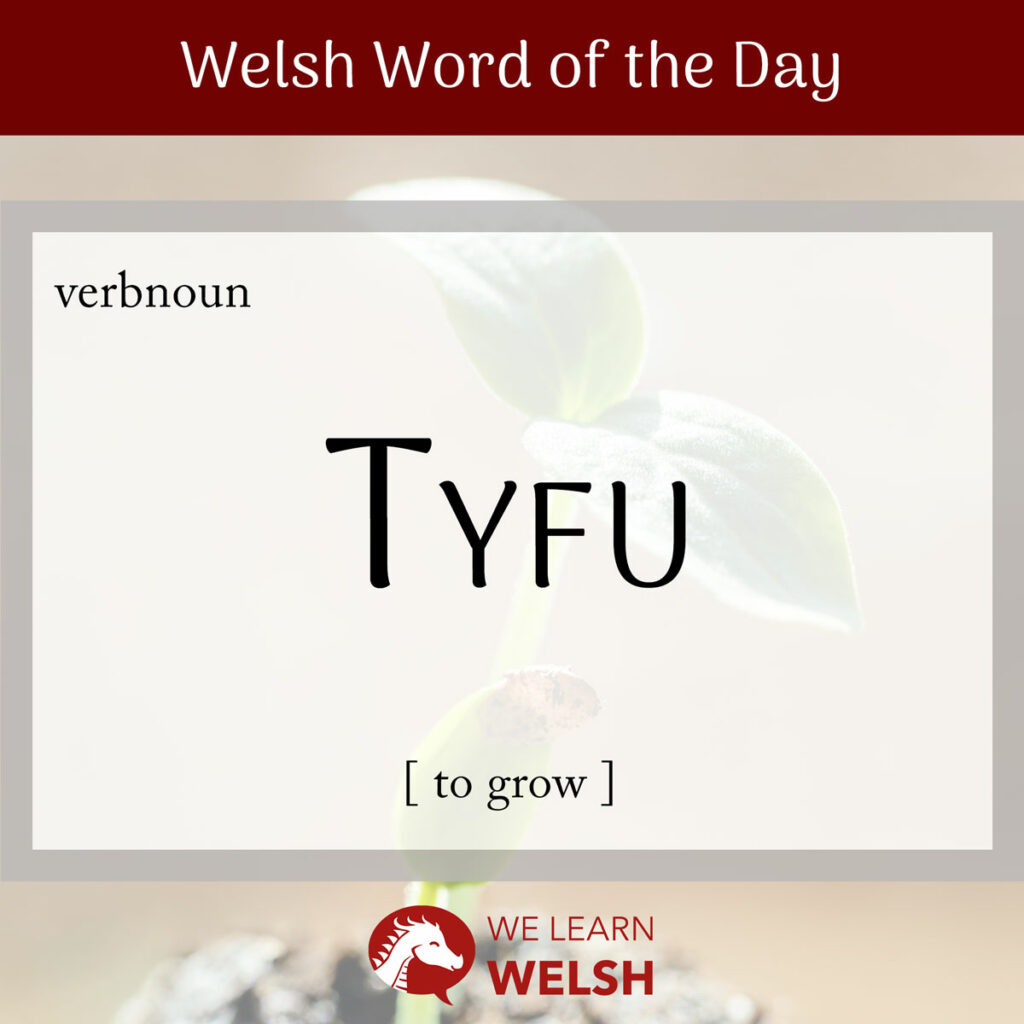The word tyfu in Welsh means to grow. It’s just like the English in that it can refer to all kinds of twf (growth), from the biological, to the financial, to the spiritual. And it can also be used for causing something to grow or helping something to grow.
tyfu
to grow
The origin of tyfu can be traced back to the Proto-Celtic *tumiti, which you might recognise as strikingly similar to the English word tumour. That resemblance isn’t coincidental – it has endured all the way from the Proto-Indo-European root *tum-, which likely meant to swell.
Tyfu and twf are also related to the words tyfiant (a growth or a tumour), tyfwr (a thing or person which grows), gordyfu (to grow too much or too fast) and aildyfu (to regrow).
Gordyfu and aildyfu are based on soft-mutated forms of tyfu, but the word could technically be affected by any of the three kinds of mutation.
Soft mutation
dyfu
Nasal mutation
nhyfu
Aspirate mutation
thyfu
When it soft mutates, it sounds very like the proper noun Dyfi – actually exactly like it if you’re speaking to someone from South Wales, where i and u are pronounced identically. But Dyfi, which is both a girl’s name and the original Welsh name of the river Dovey, doesn’t have any relation to tyfu.
Though tyfu is the most versatile of them, there are in fact a lot of Welsh words that relate to growing in some form or another.
- cynyddu = to grow / to rise
- chwyddo = to swell
- ymestyn = to extend
- ehangu = to extend
- prifio = to grow strongly / to flourish / to thrive
- ffynnu = to thrive / to prosper
- cryfhau = to strengthen
- magu = to raise
- adloddi = to regrow (of a plant)
There are a lot of phrases that rely on the word grow in English to refer to someone or something increasing in a particular quality. Think of growing fat, growing rich, or growing dark.
Mae fy mab yn tyfu mor gyflym!
My son is growing so fast!
In Welsh, tyfu isn’t usually used for this kind of thing. Actually, there are often more specific verbs for each attribute. For the above, those would be tewhau, ymgyfoethogi, and tywyllu respectively.
But you don’t have to use these – you can also use the word mynd (going) to replace growing in this kind of sentence. So mynd yn dew, for example, is just as correct and natural as tewhau.
You just need to remember to apply a soft mutation to the adjective; this is caused by the linking word yn.
Beth sy’n tyfu yn yr ardd?
What’s growing in the garden?
Another common usage of to grow is in the phrase to grow up. You can translate this literally into Welsh, making tyfu fyny or tyfu lan. Some purists or older speakers might reject this in favour of the old-fashioned dod i oed (to come to age) – but it’s perfectly fine to use the direct translation. It’s not Wenglish, just the language’s natural evolution.
Tyfu is one of the main signs and mechanisms of bywyd (life), shared by all pethau byw (living things). Humans do most of their physical tyfu as plant (children), although hopefully we keep growing emotionally and mentally throughout our lives!
The concept is also associated with gwanwyn (spring) – since that’s when we’re seeing the twf of planhigion and watching new anifeiliaid be born.
This all relies, of course, on the cooperation of natur (nature). One lovely turn of phrase using the word tyfu is glaw tyfu, literally meaning growing rain. This refers to glaw (rain) falling in gwanwyn and how it helps planhigion to prifio (thrive). A synonym is glaw Mai (May rain). I see it as a nicer, more grateful way of expressing the concept of April showers.
Dwi’n mwynhau tyfu llysiau yn y rhandir.
I enjoy growing vegetables at the allotment.
Some of the most common planhigion that people like to tyfu in their gardd (garden) include:
- rhosod / rhosynnau = roses
- tiwlipau = tulips
- llygaid y dydd = daisies
- lafant = lavender
- blodau haf = sunflowers
- tatws = potatoes
- moron = carrots
- letys = lettuce
- mefus = strawberries
But tyfu (growing) doesn’t just mean the twf in maint (size) and datblygiad (development) undergone by pobl (people), planhigion and anifeiliaid.
It also refers to twf that is economaidd (economic) and ariannol (financial). Here, it’s linked to concepts like ffyniant (prosperity), gwaith (work / employment), busnes (business) and buddsoddiad (investment).
How much an economi (economy) is tyfu (growing) is often measured using statistics based on cynnyrch mewnwladol crynswth (gross domestic product). CMC measures the gwerth (value) of all the nwyddau (products) and gwasanaethau (services) that are being produced within a particular period.
Cymru has a CMC of 27,274 punnoedd (pounds), making it one of the cyfoethocaf (richest) countries in the world – although it’s generally tlotach (poorer) than the rest of y Deyrnas Unedig (the United Kingdom).
Economyddion (economists) and other social scientists have a range of opinions on how important twf is to the political stability or quality of life of a gwlad (country).


